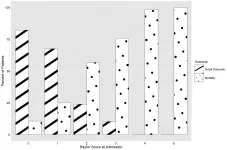(Press-News.org) CHAMPAIGN, Ill. -- A six-week training program designed to strengthen resilience against emotional distress in military veterans was associated with positive changes in brain function and increased confidence in their ability to regulate emotions, researchers report.
Published in the journal Frontiers in Psychology, the new proof-of-concept study tested two approaches for building emotional resilience in 19 veterans. The first involved weekly, 90-minute group therapy sessions focused on sharing and skills-building in 10 participants. The second trained nine veterans in the use of specific emotion-regulation strategies that previous research has shown can improve responses to emotional distress and lessen symptoms of anxiety and depression. All of the veterans in the study had been deployed in Afghanistan or Iraq in the five years prior to the study. Some reported symptoms of anxiety, depression or post-traumatic stress disorder.
"We conducted behavioral, psychometric, clinical and brain-imaging assessments before they started the training and after the training," said Florin Dolcos, a professor of psychology at the University of Illinois Urbana-Champaign who led the research with psychology professors Sanda Dolcos and doctoral student Yifan Hu. The work was conducted in the Chez Veterans Center and the Beckman Institute for Advanced Science and Technology at the U. of I.
Using resting-state functional MRI, the researchers assessed the "default" communication between brain regions while participants were awake and doing nothing. Even in a resting state, the brain is active, Sanda Dolcos said. Characteristics of a person's resting-state functional connectivity are associated with different psychological outcomes.
"Functional MRI shows how different brain regions are working together, or not," Florin Dolcos said. "For instance, in people with depression or anxiety, where the default is to ruminate on negative thoughts or memories, there is increased functional connectivity between the amygdala - a brain region involved in responding to emotional stimuli - and structures within the prefrontal cortex that regulate behavior, attention and memory."
Veterans in the group therapy intervention focused on skills such as goal-setting, problem-solving or time management. The intervention also offered psychotherapeutic approaches such as cognitive behavioral therapy. U. of I. psychology professor Howard Berenbaum and doctoral student Christian Williams designed and implemented this program. Group sizes ranged from four to eight participants.
Participants in the emotion-regulation training engaged with researchers one-on-one and learned two techniques: cognitive reappraisal, which involves finding more positive ways to think about stressful or disturbing experiences; and focused attention, in which a person directs their attention away from the most unsettling facets of an event or memory to focus instead on neutral, or even positive, details.
"We wanted to find a combination of strategies that would work both with high-intensity and low-intensity emotions, and also strategies that are less cognitively demanding," Sanda Dolcos said. Through repeated trials, some of which involved personal memories participants chose to work on in the training, the veterans gradually developed the ability to switch between strategies depending on the circumstances.
"We really wanted our participants' flexibility in using these strategies in everyday life, based on their circumstances and needs," Sanda Dolcos said.
While both groups appeared to benefit from the interventions, assessments at the end of the training revealed that participants in the emotional reappraisal and focused attention group saw greater gains in self-efficacy, the belief that one has the tools to overcome adversity.
"Higher self-efficacy is related to multiple positive outcomes because people have the confidence that they can deal with whatever life throws at them," Sanda Dolcos said. People in this group also were more likely to change their mindset about the difficult events they experienced, the researchers found.
"They developed this ability to extract meaning from the negative experiences, the traumatic experiences they went through," Hu said. "This is very, very helpful to their ability to move on and thrive."
Brain changes measured with fMRI paralleled the positive changes seen in the second group. The researchers saw a reduction in crosstalk between the amygdala and brain regions involved in self-talk, and among brain regions that control behavior, memory and attention.
Measures of depression and anxiety in participants in both groups were not significantly different at the end of the intervention than at the beginning. This may be the result of the small sample size or the brief amount of time that elapsed between the beginning and end of the intervention, researchers said. Previous studies have found that increases in a person's self-efficacy mediate a reduction in depression and anxiety, so the fact that some participants saw increases in self-efficacy may lead to further improvements with the passage of time, they said.
Further studies of emotion-regulation training should involve more participants than the current pilot study, the researchers said. But the findings offer insight into methods to help clients who have experienced traumatic events, Berenbaum said. Future interventions "are likely to bear little resemblance to traditional psychotherapy," he said. "This project demonstrated the feasibility of one potentially valuable new approach."
INFORMATION:
Editor's notes:
To reach Sanda Dolcos, email sdolcos@illinois.edu;
To reach Yifan Hu, email yifanhu2@illinois.edu;
To reach Howard Berenbaum, email hberenba@illinois.edu;
To reach Florin Dolcos, email fdolcos@illinois.edu;
The paper "Cultivating affective resilience: Proof-of-principle evidence of translational benefits from a novel cognitive-emotional training intervention" is available to members of the media from the U. of I. News Bureau.
CHARLOTTESVILLE, VA (MARCH 9, 2021). In 2014, the Journal of Neurosurgery published a paper by a group of researchers from Baylor College of Medicine in Houston, who developed a prognostic scoring system for use in patients who present to the emergency department with a gunshot wound to the head (GSWH).[1]
Today, we publish two papers by a group of researchers at Vanderbilt University Medical Center that extend our understanding of the Baylor GSWH scoring system and its application, externally validating it in a different group of patients presenting during a more recent time period in which ...
People living with a patient undergoing an intensive weight loss treatment also benefit from this therapy. This has been demonstrated by a team of researchers from the Hospital del Mar Medical Research Institute (IMIM-Hospital del Mar) along with doctors from Hospital del Mar and the CIBER on the Physiopathology of Obesity and Nutrition (CIBERObn), in collaboration with IDIAPJGol, the Pere Virgili Health Research Institute (IISPV), IDIBELL, IDIBAPS and the Sant Joan de Reus University Hospital. The study has been published in the journal International Journal of Obesity.
The study analysed data ...
About 11% of women who carry to term will experience prelabor rupture of membrane--a condition where the amniotic sac breaks open early, but labor doesn't begin.
Typically, when a woman's water breaks but labor doesn't start, labor is induced. But a new University of Michigan study found that expectant management--waiting a period of time after the water breaks for labor to begin spontaneously--did not significantly increase risk to the fetus or the mother in healthy pregnancies.
Therefore, both induction and expectant management should be considered, and the decision should be made in the context of the mother's wishes and health, said study ...
People who frequently try to impress or persuade others with misleading exaggerations and distortions are themselves more likely to be fooled by impressive-sounding misinformation, new research from the University of Waterloo shows.
The researchers found that people who frequently engage in "persuasive bullshitting" were actually quite poor at identifying it. Specifically, they had trouble distinguishing intentionally profound or scientifically accurate fact from impressive but meaningless fiction. Importantly, these frequent BSers are also much more likely to fall for fake news headlines.
"It probably seems intuitive to believe that you can't bullshit ...
The rapid spread of SARS-CoV2 (COVID-19) has not only left societies with a high number of excess deaths and a wide range of health consequences, but also taken a heavy toll on wider global economies - impacting other sectors outside health.
Future analysis must take into account societal impacts of a wide range of responses to COVID-19, if policymakers are to take better decisions about resource allocation, intervention implementation and boosting economic and social recovery.
In practice, many health economic evaluations tend to adopt a narrow study perspective predominantly estimating the economic impact around healthcare costs. They fail ...
Digital COVID-19 'symptom checkers' may stop some patients from getting prompt treatment for serious illness, suggests an international case simulation study, published in the online journal BMJ Health & Care Informatics.
Both the US and UK symptom checkers consistently failed to identify the symptoms of severe COVID-19, bacterial pneumonia, and sepsis, frequently advising these cases to stay home, the findings indicate.
The availability and use of symptom checkers is on the rise, and they are currently being used at a national level to pick up COVID-19 infection.
Identifying which patients with COVID-19 require treatment is difficult, because the infection can mimic common conditions ...
PHILADELPHIA--Even before the COVID-19 pandemic, mental health issues have been on the rise across the nation, but many struggle to access the care they need. Collaborative care--a proven approach for improving psychiatric care--combats this issue by integrating mental health professionals into the primary care setting. Penn Medicine's collaborative care program, Penn Integrated Care (PIC), utilizes a centralized resource center to facilitate intake, triage, and referral management for all patients with mental health needs. A new study, published today in the Annals of Family Medicine, suggests ...
Juvenile white-tailed deer that strike out to find new home ranges -- despite facing more risks -- survive at about the same rate as those that stay home, according to a team of researchers who conducted the first mortality study of male and female dispersal where deer were exposed to threats such as hunting throughout their entire range.
Dispersal occurs when a juvenile leaves the area where it was born and moves to a new location where the young animal establishes its adult home range, explained Duane Diefenbach, Penn State adjunct professor of wildlife ecology. The instinctual dispersal of young deer from the area where they were born to a new home range protects the species' gene pool from inbreeding with close relatives.
Diefenbach's ...
Researchers have identified a critical mechanism that allows deadly bacteria to gain resistance to antibiotics.
The findings offer a potential new drug target in the search for effective new antibiotics as we face the growing threat of antimicrobial resistance (AMR) and infections caused by bacterial pathogens.
The study investigated quinolone antibiotics which are used to treat a range of bacterial infections, including TB (tuberculosis). Quinolones work by inhibiting bacterial enzymes, gyrase and topoisomerase IV, thereby preventing DNA replication and RNA synthesis essential to growth.
They are ...
Spectacular fossil plants preserved within a volcanic ash fall in China have shed light on an evolutionary race 300 million years ago, which was eventually won by the seed-bearing plants that dominate so much of the Earth today.
New research into fossils found at the 'Pompeii of prehistoric plants', in Wuda, Inner Mongolia, reveals that the plants, called Noeggerathiales, were highly-evolved members of the lineage from which came seed plants.
Noeggerathiales were important peat-forming plants that lived around 325 to 251 million years ago. Understanding their relationships to other plant groups ...



